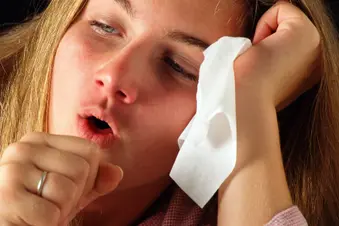How to Calm Your Nighttime Cough


Question 1/15
A cough that wakes you up at night should go away in about:
- 7 days
- 18 days
- 30 days
Question 2/15
Most coughs are caused by:
- Viruses
- Bacteria
- Allergies
Question 3/15
To ease your cough before bedtime, suck on a:
- Cough drop
- Hard candy
- Either
Question 4/15
You’ll get a better night’s sleep if you treat your cough with:
- Cough medicine
- Honey
- Both
Question 5/15
For a stubborn nighttime cough, try a combination cold medicine.
- True
- False
Question 6/15
Most coughs go away on their own, but call your doctor if:
- You make a high-pitched sound when you breathe in.
- You make a wheezing sound when you breathe out.
- Either
Question 7/15
What can help a nighttime cough?
- Echinacea
- Vapor rub
- Either
Question 8/15
Always call the doctor if your cough lasts more than:
- 10 days
- 3 weeks
- 8 weeks
Question 9/15
A cough that brings up yellow-green mucus means you have a sinus infection.
- True
- False
Question 10/15
Your cough may be caused by heartburn.
- True
- False
Question 11/15
To fend off a coughing fit, you should sleep:
- On your back
- On your side
- Propped up
Question 12/15
A humidifier can soothe your nagging hack.
- True
- False
Question 13/15
An antihistamine can quiet that tickle in your throat.
- True
- False
- Sometimes
Question 14/15
When your cough wakes you up, you should:
- Drink a glass of milk
- Sip green tea
Question 15/15
Cough it up. But is it OK if you swallow it?
- Yes
- No